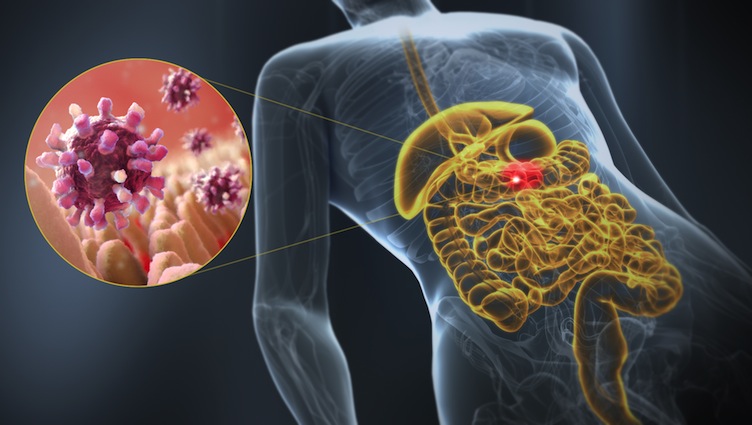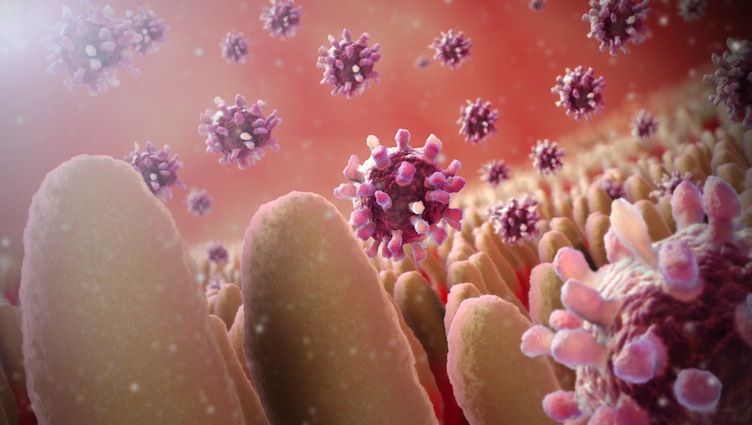 Gastroenteritis refers to inflammation and irritation of the gastrointestinal tract which includes the small intestine, large intestine, and the stomach1. The condition is mostly caused due to food poisoning, bacteria, virus, or parasites. Gastroenteritis often causes abdominal pain, diarrhea, vomiting, and nausea. This infection disrupts the regular process of absorption of water in the intestines. As a result, water from the contents of the intestines does not get into the body; which is the primary function of the intestines. This condition is commonly known as stomach flu or gastric flu although it is not caused due to influenza virus at all. It is particularly common in children and extremely contagious as well (Medical News Today, 2009).
Gastroenteritis refers to inflammation and irritation of the gastrointestinal tract which includes the small intestine, large intestine, and the stomach1. The condition is mostly caused due to food poisoning, bacteria, virus, or parasites. Gastroenteritis often causes abdominal pain, diarrhea, vomiting, and nausea. This infection disrupts the regular process of absorption of water in the intestines. As a result, water from the contents of the intestines does not get into the body; which is the primary function of the intestines. This condition is commonly known as stomach flu or gastric flu although it is not caused due to influenza virus at all. It is particularly common in children and extremely contagious as well (Medical News Today, 2009).
Causes of Gastroenteritis
 Norovirus, earlier known as Norwalk virus3, is one of the main causes of gastroenteritis. Apart from the norovirus, there are three other kinds of virus that commonly cause gastroenteritis: the rotavirus, the adenovirus and the astrovirus. These viruses mostly cause diseases among infants and young adults. They are spread by contaminated feces. The viruses get into water, food, insects, or people through the feces, the contamination then spreading through contact with any of the diseased or disease carrying agents. This process is known as fecal-oral transmission. Unfortunately, modern sanitization practices find it hard to beat these viruses, resulting in more such cases of infection.
Norovirus is the most common form of gastroenteritis in older children and adults. This disease can occur at any time of the year. Spread from the fecal-oral route, it can be transmitted form one person to the other very easily.
Rotavirus is the kind that mostly affects children ranging from 15 months to 3 years of age. According to surveys in the United States of America, an epidemic wave of diseases caused due to this particular virus takes place every year across the entire country; it starts from the Southwest America in November, and ends in March at the Northeast.
Another common reason behind the cause of gastroenteritis in children under the average age of 2 years is Adenovirus. This too can occur at any time of the year.
Astrovirus is capable of infecting people belonging to all age groups, but like the adenovirus, it mostly affects young children and infants. Records claim that it occurs generally during winters, although it's not found to be strictly true.
As far as infants are concerned, diapers are the main reason behind contamination from the various viruses. Germs carried from the feces, the main source of infection, gets on the parents’ hands as well as the baby’s body.
The viral diseases are primarily cause irritation or infection of cells that form the walls of the small intestine. As a result minerals, salts, and fluids get flushed into both the intestines and leaves the body eventually - causing diarrhea.
Food poisoning is another major cause of gastroenteritis. It is caused when the food we eat is stale or has bacterial growth. Symptoms of food poisoning arise due to the bacteria themselves, or their byproducts (like toxins) 1. A person can experience the beginning of symptoms of food poisoning within hours of eating the contaminated food, and at times, even days. This depends on the harmful effects of the particular bacterium or toxin that causes the disease (canoe.ca, 2014).
Norovirus, earlier known as Norwalk virus3, is one of the main causes of gastroenteritis. Apart from the norovirus, there are three other kinds of virus that commonly cause gastroenteritis: the rotavirus, the adenovirus and the astrovirus. These viruses mostly cause diseases among infants and young adults. They are spread by contaminated feces. The viruses get into water, food, insects, or people through the feces, the contamination then spreading through contact with any of the diseased or disease carrying agents. This process is known as fecal-oral transmission. Unfortunately, modern sanitization practices find it hard to beat these viruses, resulting in more such cases of infection.
Norovirus is the most common form of gastroenteritis in older children and adults. This disease can occur at any time of the year. Spread from the fecal-oral route, it can be transmitted form one person to the other very easily.
Rotavirus is the kind that mostly affects children ranging from 15 months to 3 years of age. According to surveys in the United States of America, an epidemic wave of diseases caused due to this particular virus takes place every year across the entire country; it starts from the Southwest America in November, and ends in March at the Northeast.
Another common reason behind the cause of gastroenteritis in children under the average age of 2 years is Adenovirus. This too can occur at any time of the year.
Astrovirus is capable of infecting people belonging to all age groups, but like the adenovirus, it mostly affects young children and infants. Records claim that it occurs generally during winters, although it's not found to be strictly true.
As far as infants are concerned, diapers are the main reason behind contamination from the various viruses. Germs carried from the feces, the main source of infection, gets on the parents’ hands as well as the baby’s body.
The viral diseases are primarily cause irritation or infection of cells that form the walls of the small intestine. As a result minerals, salts, and fluids get flushed into both the intestines and leaves the body eventually - causing diarrhea.
Food poisoning is another major cause of gastroenteritis. It is caused when the food we eat is stale or has bacterial growth. Symptoms of food poisoning arise due to the bacteria themselves, or their byproducts (like toxins) 1. A person can experience the beginning of symptoms of food poisoning within hours of eating the contaminated food, and at times, even days. This depends on the harmful effects of the particular bacterium or toxin that causes the disease (canoe.ca, 2014).
Precautionary Measures for Avoiding Gastroenteritis
Since gastroenteritis is highly infectious, certain precautions need to be taken such that it does not spread to other. Here are certain steps to control the infection: Washing hands for a considerable amount of time and thoroughly, after using the toilet. Also before preparing or eating meals. If anyone in the house is suffering from diarrhea or has had bouts of vomiting, the toilet including the handle and the seat, should be cleaned every time with a disinfectant. One should refrain from sharing flannels, cutlery, utensils, and towels with others in the house. When returning to the workplace, at least two days should have passed since the last incident of diarrhea or bouts of vomiting.Food Hygiene
Also, practicing proper measures to ensure food hygiene helps avoid contracting gastroenteritis due to food poisoning. Some of the primary precautions one should take are:- Wash hands, utensils and surfaces regularly with soapy and hot water
- Avoid storing of cooked and raw food at the same place
- Ensure that all food is refrigerated properly
- Ensure that food is always thoroughly cooked
- Never consume food products that have passed the expiry date
- tap water
- ice cream or ice cubes
- fruit juices (if it is sold by street vendors)
- shellfish
- salads
- eggs
- raw and undercooked meat
- mayonnaise
- peeled fruit
- sauces
Treatment of Gastroenteritis
 Although in most cases, people recover from gastroenteritis without getting into complications, many infants and elderly people often get seriously affected. When left untreated, this disease can cause life-threatening complications like gastrointestinal bleeding and dehydration3. Drinking a lot of water is one of the primary requisites to treat this disease. In many instances, fluids are injected into the patient’s body through IV in order to rehydrate. Maintaining a standard level of hydration along with prescribed medicines is important for treatment of gastroenteritis.
Although in most cases, people recover from gastroenteritis without getting into complications, many infants and elderly people often get seriously affected. When left untreated, this disease can cause life-threatening complications like gastrointestinal bleeding and dehydration3. Drinking a lot of water is one of the primary requisites to treat this disease. In many instances, fluids are injected into the patient’s body through IV in order to rehydrate. Maintaining a standard level of hydration along with prescribed medicines is important for treatment of gastroenteritis.
Digestive System Animation
Scientific animations has done work in every aspect of the gastro-intestinal tract, inside and out. With a particular ability to show meshes well, we often get called on to do hernia, prolapse, post-surgical wound management and other surgeries that use meshes. Read More..








